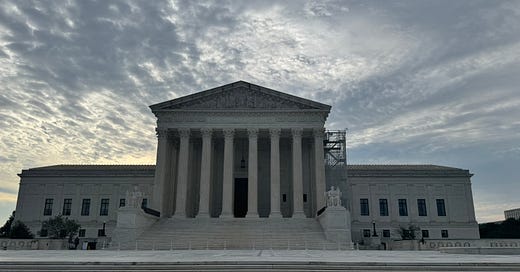Summary: The Supreme Court is hearing arguments about whether employers are required to waive cost sharing for preventive services.
View of the Supreme Court, July 2024
The Supreme Court will hear oral arguments in the Braidwood case next week (Kennedy v. Braidwood), and the requirement that employer-sponsored health plans cover preventive services with no cost sharing hangs in the balance. Braidwood Management, a closely-held private company with 70 employees that is self insured, has challenged the structure of the U.S. Preventive Services Task Force (USPSTF), which recommends evidence-based preventive services. Braidwood claims that the USPSTF formation violates the Constitution's appointments clause because its members are not appointed by the President and confirmed by the Senate.
Share of those with private insurance receiving preventive care
Source: Amin, et al Peterson Kaiser Center, 2023. This includes all preventive care, and data is from 2018
The recommendations of the USPSTF are built into the Affordable Care Act (ACA) regulations which require that employer-sponsored health plans cover preventive care with no cost sharing. A district court found for the plaintiff that the USPSTF was improperly constituted, and a federal appeals court agreed with this finding. The plaintiffs also objected to being required to provide coverage of oral contraceptives and HIV prevention medication on the basis of their religious beliefs.
There are three federal committees or agencies that recommend preventive care that is to be covered without cost sharing under the ACA:
USPSTF - general preventive care such as cancer screening and heart disease and HIV prevention
Health Resources and Services Administration (HRSA) women’s and children’s preventive care including birth control
Advisory Committee on Immunization Practices (ACIP) - vaccinations
The Appeals Court found that only the USPSTF was improperly constituted, so recommendations from HRSA and ACIP should not be affected by the eventual Supreme Court decision. The religious objections to coverage of contraception and PrEP (pre-exposure prophylaxis for HIV infection) were returned to the district court.
Most preventive care is inexpensive, and some (like pediatric vaccinations and birth control) lowers medical costs. An exception is PreP drugs to prevent HIV. Although a generic medication is available for just $250 annually, many people are prescribed brand name medications which cost over $20,000 annually.
Uptake of preventive care is higher with waived cost sharing, and a return to cost-sharing would likely decrease the uptake of high value care. Here’s a link to a February post on what could happen to PrEP use if cost sharing is imposed. Here’s a link to a KFF summary of USPSTF recommendations made after March 10, 2010, which are most at risk depending on how the Supreme Court rules.
Implications for employers:
If the Supreme Court overturns some or all of the mandates to cover preventive care without cost sharing, employers with self-insured health plans would have to decide which preventive services would continue to be offered without cost sharing.
Waiving costs for preventive care is very popular with plan members, and most employers are likely not to make immediate changes to their plan benefits.
Employers might choose to limit PrEP coverage to the generic medication, although this is not the best choice for people with kidney disease, and an annual injection (that is not available generically) could dramatically decrease new cases of HIV.
Thanks for reading. You can find previous posts in the Employer Coverage archive
Please subscribe, “like” share this newsletter with friends and colleagues. Thanks!
Tomorrow: New report shows mortality associated with childbirth




